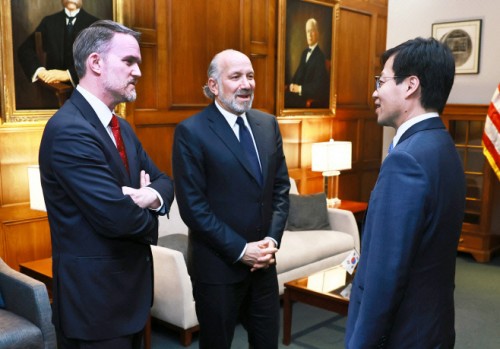 |
| Yeo Han-koo (right), Korea’s chief trade negotiator, speaks with U.S. Commerce Secretary Howard Lutnick (center) and USTR official Jamieson Greer during a meeting at the U.S. Department of Commerce in Washington, D.C., on June 23. / Source: Ministry of Trade, Industry and Energy |
U.S. Commerce Secretary Howard Lutnick said on July 23 that South Korea was likely shocked by the recent trade agreement between the United States and Japan, suggesting that Korean officials might have even reacted with “expletives.”
In an interview with CNBC, Lutnick remarked, “Just like Europe, Korea very, very much wants to finalize a trade deal.” He added, “You could hear the cursing coming out of Korea when they read the Japan agreement because Korea and Japan are watching each other closely.”
Lutnick continued, “So you can imagine what Korea must’ve thought when they saw Japan’s deal. They probably said, ‘Oh man.’ Of course, Korea will be in my office today to talk.”
According to Korean government sources, Minister of Trade, Industry and Energy Kim Jung-kwan and Trade Negotiator Yeo Han-koo met with Lutnick at the U.S. Department of Commerce in Washington, D.C., that day.
The Korean delegation is reportedly focusing its efforts on negotiating a reduction in tariffs from 25% to 15%, the same level Japan secured.
Lutnick’s comments suggest the Trump administration is well aware of South Korea’s position.
When asked whether the 15% tariff is the new standard, Lutnick replied, “I want to talk about the deal with Japan — it was really incredible.” He explained that Japan not only agreed to pay a 15% tariff but also committed to $550 billion in investments, which will be used at the discretion of President Trump and the American people to build infrastructure in areas such as energy, generic pharmaceuticals, and shipbuilding. “It’s absolutely fantastic,” he added.
Under the agreement, Japan will reduce the mutual and auto tariffs from 25% to 15% in exchange for opening its markets to U.S. cars and rice, and pledging $550 billion in investments.
When a CNBC host pointed out that intellectual property (IP) for parts used in Korean assembly plants in the U.S. originates in Korea, Lutnick responded, “We will impose tariffs not only on finished goods, but also on engines and parts — because if we hit the parts, we hit the ideas.”
He added, “Korean manufacturers are now producing a lot of vehicles here, but as you pointed out, they tend to import a lot from overseas. We will place tariffs on that.”
Most Read
-
1
-
2
-
3
-
4
-
5
-
6
-
7





















